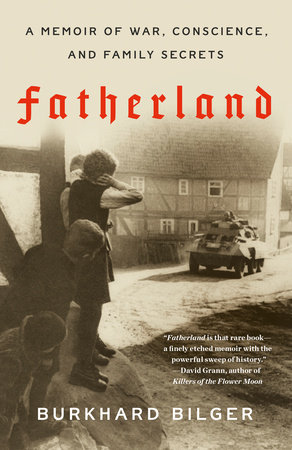Excerpt
Fatherland
1
SuspectThe man in the interrogation room had all the marks of a dangerous fanatic: stiff spine and bony shoulders, lips pinched into a pleat. He wore brass spectacles with round, tortoiseshell rims and his head was shaved along the back and sides, leaving a shock of brown hair to flop around on top, like a toupee. When he posed for his mug shot, his expression was strangely unbalanced. The left eye had a flat, unwavering focus, edged with fear or grief. The right eye was glazed and lifeless.
The French inspector, Otto Baumgartner, paced in front of him reading from a typewritten sheet. “In October of 1940, you moved to Alsace and set yourself the task of converting the inhabitants of Bartenheim to National Socialism,” he began. “You established yourself as Ortsgruppenleiter in order to become the town’s absolute master. . . . You brought to your duties a zeal and a tyrannical fervor without equal! In the entire district of Mulhouse, you were the most feared and infamous of leaders!”
Baumgartner paused after each charge to let the prisoner respond, while another inspector transcribed the exchange. It had been nearly a year since the German surrender, and these men had heard their share of pleas and denunciations. The countryside seethed with military courts and citizens’ militias, lynch mobs and makeshift tribunals. For four years, the Nazi occupation had divided France ever more bitterly against itself, turning neighbor against neighbor and Christian against Jew. Now the days of reckoning had come. More than nine thousand people would be executed as war criminals and collaborators over the next five years, in addition to those denounced and beaten; the women shorn and shaved and paraded through towns for sleeping with German soldiers. L’épuration sauvage, the French called it: the savage purification.
The facts in this case were not in question. They came from a seemingly unimpeachable source: Captain Louis Obrecht, an adjunct controller in the French military government and president of the local Purification Commission. Obrecht was a veteran of the French army and a former prisoner of war. When German forces invaded Alsace in 1940, Obrecht was the school principal in the village of Bartenheim, where the prisoner later became Ortsgruppenleiter, or the town’s Nazi Party chief. For four years, Obrecht insisted, the prisoner had been the terror of Bartenheim. “But it was above all in the last year of ‘his reign’ that he became menacing and dangerous.”
Obrecht went on to accuse the man of crimes ranging from sabotage to using French children as spies. But the investigators zeroed in on a single incident: the murder of a local farmer named Georges Baumann. On the morning of Wednesday, October 4, 1944, a German military police chief named Anton Acker ordered Baumann to report for a work detail, building wooden pallets for the German army. Baumann refused. The war had turned against Germany by then, and the Allies were on their way. He had no intention of working for “those German swine,” he said. When Acker tried to arrest him, a scuffle ensued, and Baumann and his family disarmed the officer.
Their victory was short-lived. Within the hour, Acker returned with five other policemen. Baumann was arrested, as were his wife and daughter later that day, while his son fled into the fields. The three prisoners were taken to a police station, where they were detained and beaten. By that evening, Baumann lay half dead. “I found him on the floor of the station, unconscious, his hair, cheeks, and forehead covered in blood,” a local doctor later told investigators. “His scalp was split open, without a doubt from blows of a rifle butt, and he also had a bullet wound in his pelvis, with tears in his intestines and probably an artery as well.” Baumann died in the hospital that night. By then, bruises from the bludgeoning had begun to appear all over his body.
The death of Georges Baumann could be traced back to one man, Obrecht believed. It was set in motion by a direct order from the prisoner in the interrogation room. “For four years, he made thousands of innocent people suffer,” Obrecht said, and the inspectors had no reason to doubt him. The war had been over for nearly a year and fresh horrors were still being unearthed in mass graves and killing fields and concentration camps across Europe. There was more than enough guilt to go around.
Yet the inspectors had also heard rumors of a different sort. There was talk that this gaunt, bespectacled bureaucrat—this “perfect Nazi,” as some people described him—was the opposite of what Obrecht claimed. That far from terrorizing two villages, he had shielded them from the worst Nazi excesses during the occupation. That without him many more might have died. It was an unlikely story. But in those days of furious judgment, justice could be hard to tell from self-justification, and purity was often code for revenge.
The inspectors would look into the matter. In the meantime, the case would be remanded to the military court in Mulhouse, and the prisoner—my grandfather, Karl Gönner, forty-seven years old and a father of four, one of them my mother—would be sent to solitary confinement in Strasbourg. To await judgment in the Citadel, the seventeenth-century fortress along the River Ill, where the worst German war criminals in Alsace were kept.




